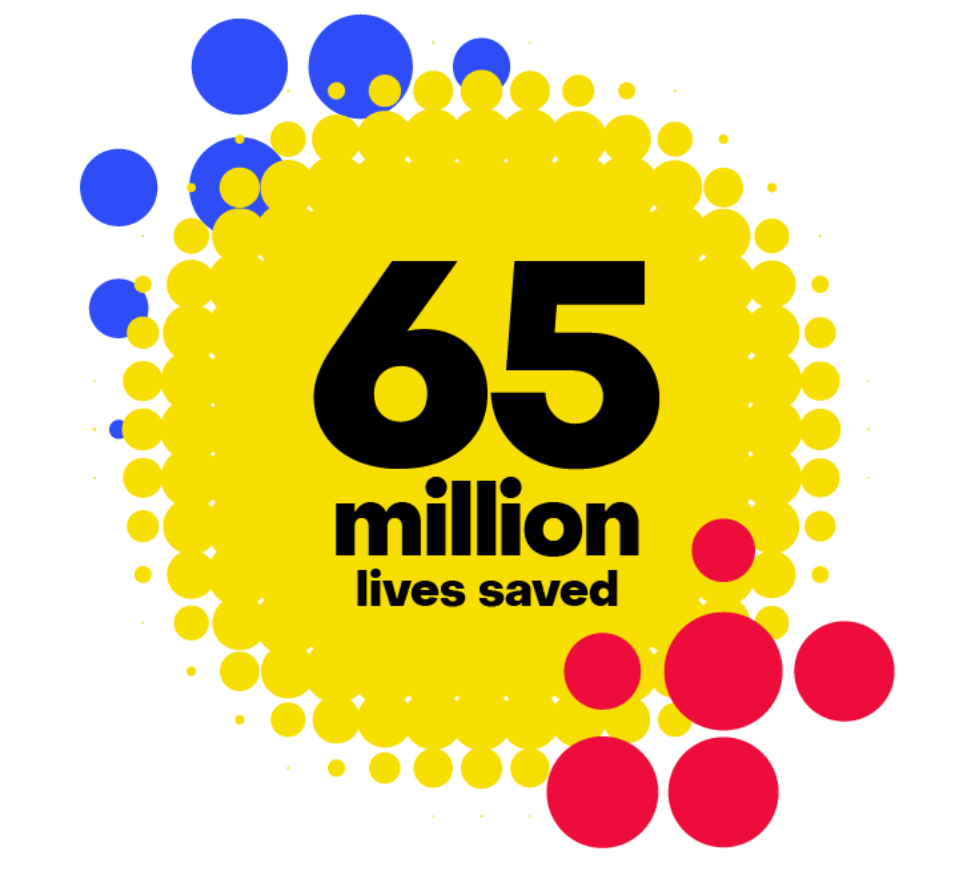September 19, 2024
New report: Global Fund partnership has saved 65 million lives since 2002

2023 was a year of important progress in the fight against HIV, TB and malaria. Report finds reduced HIV incidence in adolescent girls and young women; increased use of innovative new tools to treat TB and malaria; broader health systems cost savings; treatment price reductions; and critical investments in crisis settings, including Ukraine.
The Global Fund partnership has saved 65 million lives and cut the combined death rate from AIDS, TB and malaria by 61% since 2002, new data in the 2024 results report shows.
2023 was a year of significant progress in the fight against HIV, TB and malaria. In countries where the Global Fund invests, the response to HIV, TB and malaria has fully recovered from the disruptions in service delivery caused by COVID -19.
In addition, in 2023, 25 million people were on antiretroviral therapy for HIV; 7.1 million people were treated for TB; and 227 million mosquito nets were distributed.
AIDS
In countries where the Global Fund invests, AIDS-related deaths have been reduced by 73% since 2002, and new infections have been reduced by 61%. At the end of 2023, 84% of people living with HIV knew their HIV status, 78% of people living with HIV were on lifesaving HIV treatment and 72% of people living with HIV had a suppressed viral load.
The results report also shows that there has been a 69% reduction in the HIV incidence rate since 2010 for adolescent girls and young women in 13 focus countries in sub-Saharan Africa. Long-standing gender inequalities, discrimination and poverty increase the risk of HIV for this demographic.
TB
As for TB, more people with the disease were found and treated than ever before. Two million people exposed to TB received preventive therapy and 121,000 people were on treatment for drug-resistant TB in 2023. The Global Fund is continuing to invest in innovative tools and novel approaches to find and treat the millions of “missing” people with TB, including mobile diagnostic units, AI-powered computer-aided detection software and digital chest X-rays. The tuberculosis mortality rate has reduced by 54% since 2002, and the incidence rate declined by 28%.
Malaria
The Global Fund also expanded access to powerful tools to prevent and treat malaria in 2023, including insecticide-treated mosquito nets, seasonal malaria chemoprevention for children at high risk, intermittent preventive treatment of malaria for pregnant women, indoor residual spraying and antimalarial medicines. New modelling shows that without malaria control efforts in countries where the Global Fund invests, there would have been a 90% increase in malaria deaths since 2002.
Global Fund investments led to health system cost savings
In addition to direct investments in health and community systems, Global Fund investments in the fight against HIV, TB and malaria has freed up resources and capacities, helping countries better able to respond to other diseases. For example, as of the end of 2023, investments in HIV have freed up 1.7 billion HIV-related hospitalization days and averted 1.4 billion outpatient visits, generating $85 billion in cost savings.
Market shaping resulted in key price reductions across three diseases
The Global Fund’s market shaping efforts have also resulted in significant price reductions for key commodities across the three diseases. This includes a 25% price reduction for the preferred first-line HIV treatment, a 20% price reduction for diagnostic test cartridges for TB, as well as a 55% reduction for bedaquiline, the main treatment for drug-resistant TB. The Global Fund also secured new dual active ingredient insecticide-treated nets at a comparable price to conventional nets, to provide better protection against insecticide-resistant mosquitoes. All these efforts have enabled governments to expand interventions and invest in other critical areas. In addition, the Global Fund is working directly with countries to strengthen their capacities to prevent, prepare for and respond to existing and emerging infectious diseases, such as cholera, Ebola and mpox.
Investing in challenging operating environments
In 2023, the Global Fund continued its work in challenging operating environments. In Ukraine, for example, more than 1,500 health facilities have been attacked over the past two years, leaving health care workers and patients displaced, injured or dead. At the end of 2023, 158,000 people were living with HIV in Ukraine. There were 36,000 cases of TB in 2022, according to the most recent data. Ensuring continuity of HIV and TB services has required flexibility and intense collaboration between Ukraine’s ministry of health and civil society and community partners, and over 100 community- based and community-led organizations. In addition to the $166 million country allocation for Ukraine for 2024-2026, the Global Fund has provided $28 million from its emergency fund.
